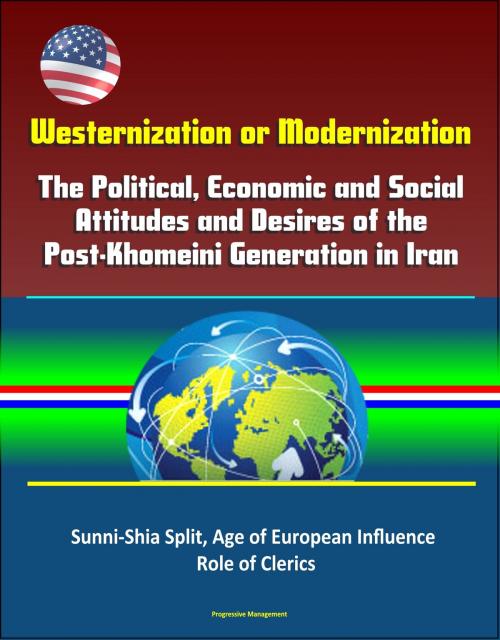Westernization or Modernization: The Political, Economic and Social Attitudes and Desires of the Post-Khomeini Generation in Iran - Sunni-Shia Split, Age of European Influence, Role of Clerics
Nonfiction, History, Military, Strategy| Author: | Progressive Management | ISBN: | 9781310260353 |
| Publisher: | Progressive Management | Publication: | June 20, 2016 |
| Imprint: | Smashwords Edition | Language: | English |
| Author: | Progressive Management |
| ISBN: | 9781310260353 |
| Publisher: | Progressive Management |
| Publication: | June 20, 2016 |
| Imprint: | Smashwords Edition |
| Language: | English |
This excellent report has been professionally converted for accurate flowing-text e-book format reproduction. The purpose of this paper is to answer the following question: Does the generation of Iranians born after the 1979 revolution wish to continue living under the system established by Ayatollah Khomeini, or do they wish to modernize (or perhaps westernize) their current political, social, and economic systems? This group is significant because 70% of the population of Iran is under the age of 30, and an amazing 50% is under the age of 21. This paper has four major conclusions. The first is that young Iranians have subordinated their immediate desire for political change for changes in the economic and social policies of Iran. The second conclusion is that any eventual change in the Iranian political system will be evolutionary rather than revolutionary. The third conclusion is that the United States government has little ability to directly influence the attitudes and desires of these young Iranians directly. However, the last conclusion proposes that the United States government can effectively influence these groups indirectly, through the use of three identified leverage points.
The leverage points fall into the general groupings of media, economics, and education. Finally, the paper assesses as low the probability that the under-30 generation in Iran will attempt to effect political change in the near term.
This excellent report has been professionally converted for accurate flowing-text e-book format reproduction. The purpose of this paper is to answer the following question: Does the generation of Iranians born after the 1979 revolution wish to continue living under the system established by Ayatollah Khomeini, or do they wish to modernize (or perhaps westernize) their current political, social, and economic systems? This group is significant because 70% of the population of Iran is under the age of 30, and an amazing 50% is under the age of 21. This paper has four major conclusions. The first is that young Iranians have subordinated their immediate desire for political change for changes in the economic and social policies of Iran. The second conclusion is that any eventual change in the Iranian political system will be evolutionary rather than revolutionary. The third conclusion is that the United States government has little ability to directly influence the attitudes and desires of these young Iranians directly. However, the last conclusion proposes that the United States government can effectively influence these groups indirectly, through the use of three identified leverage points.
The leverage points fall into the general groupings of media, economics, and education. Finally, the paper assesses as low the probability that the under-30 generation in Iran will attempt to effect political change in the near term.















